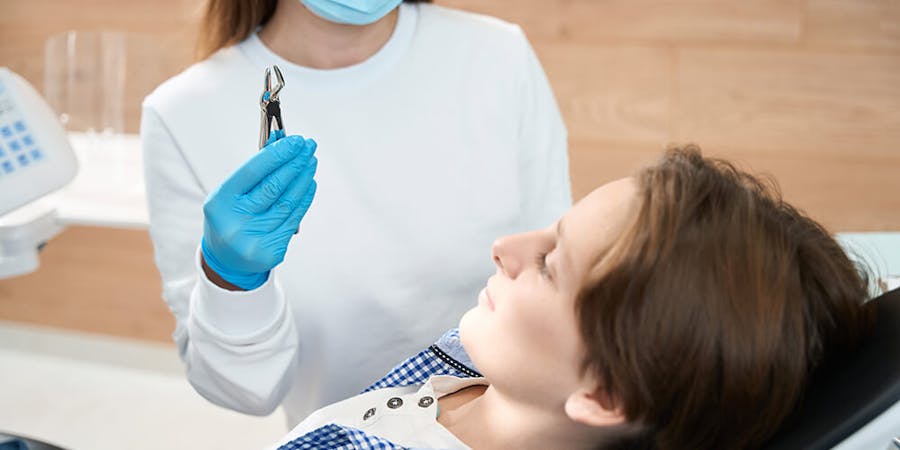Dental Extractions Ville Saint-Laurent

There are many different reasons for performing dental extractions. The most frequent reason for tooth extraction is tooth decay that has destroyed enough tooth structure to prevent repair. Other indications include impacted or troublesome wisdom teeth, as well as the need to provide room for orthodontic treatment in specific circumstances.
When Tooth Extraction is Necessary: Common Reasons
Most of the time, we attempt to keep the tooth by performing additional operations rather than extracting it. The best course of action, though, may be to pull the tooth if the damage is too great.
Common reasons for tooth extraction include:
- Crowded teeth, particularly when extraction is necessary to create space for proper alignment of other teeth;
- Infection risk caused by gum disease;
- Severe tooth decay that severely damages the pulp and nerves;
- Cracked roots that cannot be repaired.
What to expect during tooth extraction?
We administer a local anesthetic to numb the area around the tooth. Occasionally, we may need to break an impacted tooth into smaller pieces to minimize damage to the surrounding tissue before extraction. After we remove the tooth, we use stitches to seal the socket.
What you should tell your Dentist before tooth extraction procedure?
It's crucial to let your dentist know about any underlying medical issues or current prescription medications before having a tooth extracted. This includes any disorders affecting your immune system, liver, heart, or other pertinent organs. To ensure the surgery is successful, your dentist needs to understand your medical history.
Commonly asked question about tooth extractions
Can I go back to work after having an extraction?
Your dentist will asses if you need to rest, depending on your case. It could be challenging to work if there is swelling or you have trouble speaking. For 1-3 days following surgery, you should refrain from heavy lifting, bending over, and exercising.
Managing Pain After Tooth Extraction
For most patients, over-the-counter painkillers are sufficient. If you have a special case or have certain allergies, your dentist may prescribe medication. It is advised to take pain medication as soon as possible following the extraction, while you are still numbed, to support you while the local anaesthetic wears off. Avoid aspirin since it can thin the blood and stop blood from clotting.
How long will the discomfort persist following tooth removal?
Depending on the procedure and how quickly you heal, the amount of discomfort you experience may vary. After a few days, the pain should start to go away. If you find that your pain and discomfort increase after one week, you may be experiencing a dry socket and should immediately contact your dentist.
What can I eat or drink after tooth extraction?
It's best to stick to a liquid and soft food diet immediately after the tooth extraction procedure to ensure comfort. Most patients continue doing this for a few days following their therapy until the pain stops. Avoid using straws since the sucking motion can strain your stitches and result in fresh bleeding.
POSSIBLE COMPLICATIONS FOLLOWING SURGERY
- Bleeding (abnormal after 24 hours).
- Infection (swelling that worsens after the first 24 hours following surgery).
- Swelling (normal, maximum after 48 hours, then should reduce).
- Dry socket (pain that appears 3 to 5 days following the extraction and that is not calmed by analgesics, may be accompanied by bad breath).
- Limited mouth opening (can last 3 to 6 weeks).
- Paresthesia (when a portion of the tongue, cheek or lip remains “frozen”. Happens in about 2% of cases of which 90% are reversible and will disappear with time; usually from a few weeks to several months).
- Ecchymosis (a “bruise” is normal and will disappear within a few days).
INSTRUCTIONS FOLLOWING ORAL SURGERY
- Bite down on the cotton and replace it every 20 minutes until the bleeding stops. If you run out of cotton, use a tea bag. It is normal to have a slight amount of blood in your saliva for the first two days.
- Take the medicine that was prescribed to you by the dentist.
- If medication was not prescribed, you may take analgesics such as Advil or Tylenol in case of pain.
- For the first 48 hours, you should avoid rinsing your mouth, spitting, drinking with a straw, smoking or eating any hard,too hot, too cold or spicy food. You should eat on the other side something soft. You should avoid physical exercises for 48 hours.
- If your received any stitches, apply compresses room temperature on your cheek for 20 minutes, stop for 10 minutes then repeat again. Repeat this sequence for the first day only. The stitches will fall out within a week.
Should you have any problems or questions, call us.
Dr. Strobach Dental Clinic is experienced in performing tooth extractions and we try to make the procedure as comfortable and stress-free as possible.
